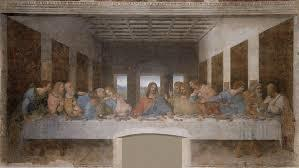Luke 21‒22
Judas promises to betray Jesus
Luke 22
1 And the festival of unleavened bread was near, which is
called the Passover.
2 And the chief priests and scribes sought how they might
slay Him, for they feared the people.
3 And Satan entered into Judas, called Iscariot, being of the
number of the twelve.
4 And he went away, and spoke with the chief priests and
captains how he might betray Him to them.
5 And they rejoiced, and put together an agreement to give him
silver.
6 And he promised, and sought an opportunity to betray
Him to them in the absence of the crowd.
AC 2342. And baked unleavened [bread]. That this signifies purification, is evident from the signification of “unleavened” or “unfermented.” In the Word “bread” signifies in general all heavenly and spiritual food, thus heavenly and spiritual things in general.... That these should be free from everything impure was represented by bread without leaven; for “leaven” signifies that which is evil and false, by which heavenly and spiritual things are rendered impure and profane. On account of this representation it was commanded those who were of the Representative Church that in their sacrifices they should not offer any other bread, that is, gift-offering, than that which was unfermented or unleavened....
AC 2342:2. And it was therefore also commanded that on the seven days of the Passover they should not eat any other than unfermented or unleavened bread, as stated in Moses:
Seven days you shall eat unleavened [bread]; even on the first day, you shall cause leaven to cease from your houses. For whoever eats what is leavened, from the first day until the seventh day, that soul shall be cut off from Israel. In the first month, on the fourteenth day of the month, at evening, you shall eat unleavened [bread], until the one and twentieth day of the month at evening; [for] seven days no leaven shall be found in your houses. For whoever eats what is leavened, that soul also shall be cut off from the congregation of Israel, whether he be a sojourner or born in the land (Exod. 12:15, 18-20, and elsewhere....
Hence the Passover is called the “festival of unleavened bread” (Lev. 23:6; Num. 28:16, 17; Matt. 26:17; Luke 22:1, 7).
AE 740:2. ...Both “the devil” and “Satan” signify hell, “the devil” signifying the hell from which are evils, and “Satan” the hell from which are falsities. This hell is called “Satan” because all who are in it are called satans, and the other hell is called “the devil” because all who are in it are called devils....
AE 740. In a word, they love the things of the body and of the world above all things, and they love heavenly things only as things serviceable. Thus they make the things of the body and of the world the head, and heavenly things the feet. They are such because they make the life to be of no account, saying that faith alone saves, and not any good of life.... Moreover, a man continues [to be] such after death; for such as a man is interiorly, such he is in respect to the spirit, and the spirit of man is the affection from which is the will and the life from it. From this it follows that those who make no account of the life are interiorly devils and satans, and they also become devils and satans when their life in the world is ended and they become spirits.
AE 740:8. The Lord calls Judas Iscariot:
A devil (John 6:70);
And it is said that the devil put into his heart (John 13:2);
And that after he had taken the sop, Satan entered into him (John 13:27; Luke 22:3).
It is so said because Judas Iscariot represented the Jews who were in falsities from evil; and therefore from evil he is called a “devil,” and from falsities a “satan.” Therefore it is said that “the devil put it into his heart,” “to put into the heart” meaning into the love that is of his will. Also it is said that “after he had taken the sop, Satan entered into him,” “to enter into him with the sop” meaning into the belly, which signifies into the thought, and falsities from evil belong to the thought.
AC 4751e. ...When he sold the Lord, Judas’ representation was similar to that which Judah has in Genesis 37 when he said, “Come, and let us sell Joseph.”
Questions and Comments
- How can we spiritually celebrate the festival of unleavened bread? How can we receive love to the Lord and love toward the neighbor free from impurities of evil and falsity? Or in other words, how can we prepare for the holy supper?
- Why did the Lord call Judas to be one of the twelve?
- “The devil” and “Satan” are representative figures in the Word, not particular human beings or fallen angels. What are some steps we can take to avoid having the devil and satan enter into us, or to flee from them, or to drive them out if they have invaded?
| previous |  |
next |
|---|


